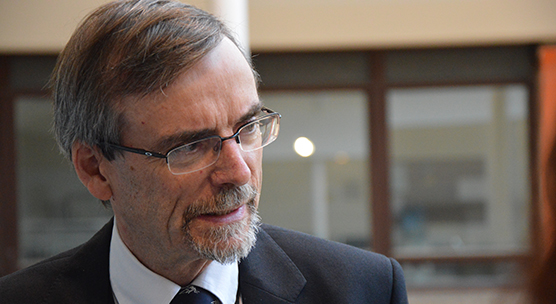New bowel cancer home screening test to be introduced across country
Published On Wed 18 Feb 2015 by Grant Hill

Robert Steele, Professor of Surgery and Head of Cancer Research at the University of Dundee, has welcomed the introduction of a new bowel cancer test which simplifies sample collection in a bid to increase participation in Scotland’s national bowel screening programme and save more lives.
The announcement was made by Health Secretary Shona Robison when she joined cancer clinicians, charities and patients to mark the three year anniversary of the Scottish Government’s Detect Cancer Early (DCE) programme, which has received an additional £9 million commitment for 2015/16.
The new FIT home screening test (faecal immunochemical test), that will see participants returning just one bowel motion sample instead of the three samples required for the current test, will be introduced over the next two years to help boost uptake in the Scottish Bowel Screening Programme from its current level of 56.1 per cent.
The existing test has proved hugely valuable in detecting cancer early and remains the most effective way of detecting bowel cancer in its earliest stages. It is therefore essential that Scots aged 50-74 continue to complete and return the test they receive through their door during the transition period.
Professor Steele, Director of the Scottish Bowel Screening Programme, said, “The bold approach of DCE has helped break down barriers people face when it comes to talking about ‘down there’ and resulted in even more bowel screening kits being requested and returned than ever before.
“It’s fair to say that Scotland has taken several strides in the last three years towards making bowel screening a social norm and we expect the introduction of the new bowel screening test will continue to drive uptake rates in the national screening programme, saving more lives.”
The announcement came as the Health Secretary reflected on the achievements of the ground-breaking DCE programme, which aims to increase the proportion of people who are diagnosed in the early stages of breast, bowel and lung cancer by 25 per cent by the end of 2015.
Launched in February 2012, DCE has worked with leading clinicians and charities to develop innovative projects, increase diagnostic capacity and support clinical posts, as well as driving improvements in screening and training.
High profile marketing campaigns – featuring Elaine C Smith and Sir Alex Ferguson – have also helped raise awareness of early signs and symptoms and reassure Scots that cancer can be beaten, and often cured, if detected early.
Ms Robison said, “It is fantastic to reach this important milestone, particularly as we announce a new bowel cancer screening test that will enhance our ability to save lives through the earlier detection of bowel cancer.
“Over the last three years, DCE has adopted bold approaches to make people aware of the signs and symptoms of cancer, invested in innovative projects and delivered advancements in screening. It will be a while before we can see the full impact of the programme but we’re starting to see positive results emerge.
“We’ve also seen an important shift change in the attitudes Scots have towards the disease, with more people recognising the benefits of early detection and value of screening. Continuing to drive this awareness of the benefits of early detection is key to getting people to act sooner rather than later and increasing survival rates.
“As we look towards the future of DCE, I want to express my gratitude to those who have supported the programme so far. Each individual effort has contributed to us making a difference, improving outcomes for people with cancer, and improving the health of the nation.”
With DCE contributing to 24.3 per cent of all breast, bowel and lung cancers in 2012 and 2013 being diagnosed at the earliest stages2, further achievements from the last three years include:
Bowel:
• 80.6 per cent increase in the average number of replacement bowel screening kits requested each month since launch3
• On average, 4,300 more kits are returned each month compared to pre-campaign activity4
Breast:
• 50 per cent more women visited their GP with concerns about breast cancer following the ‘lumps aren’t the only sign’ breast symptoms campaign in September 20125
• Spontaneous awareness of breast cancer symptoms included in the campaign, other than lumps, doubled during the campaign period6
Lung:
• 50 per cent increase in the proportion of 55+ year olds from areas of deprivation who disagreed strongly that they would ‘feel silly’ going to the doctor with any changes they thought could be lung cancer7
• Almost a sixth more men aged over 40 disagree that you can’t survive lung cancer8
Emma Anderson, Bowel Cancer UK added, “Before DCE the topic of bowel cancer was a hard thing to raise. Since the campaign people are openly talking to us, asking questions and telling us about their experiences. It’s helped normalise what was an otherwise difficult topic.”
For media enquiries contact:
Grant Hill
Press Officer
University of Dundee
Nethergate, Dundee, DD1 4HN
TEL: 01382 384768
E-MAIL: g.hill@dundee.ac.uk
MOBILE: 07854 953277